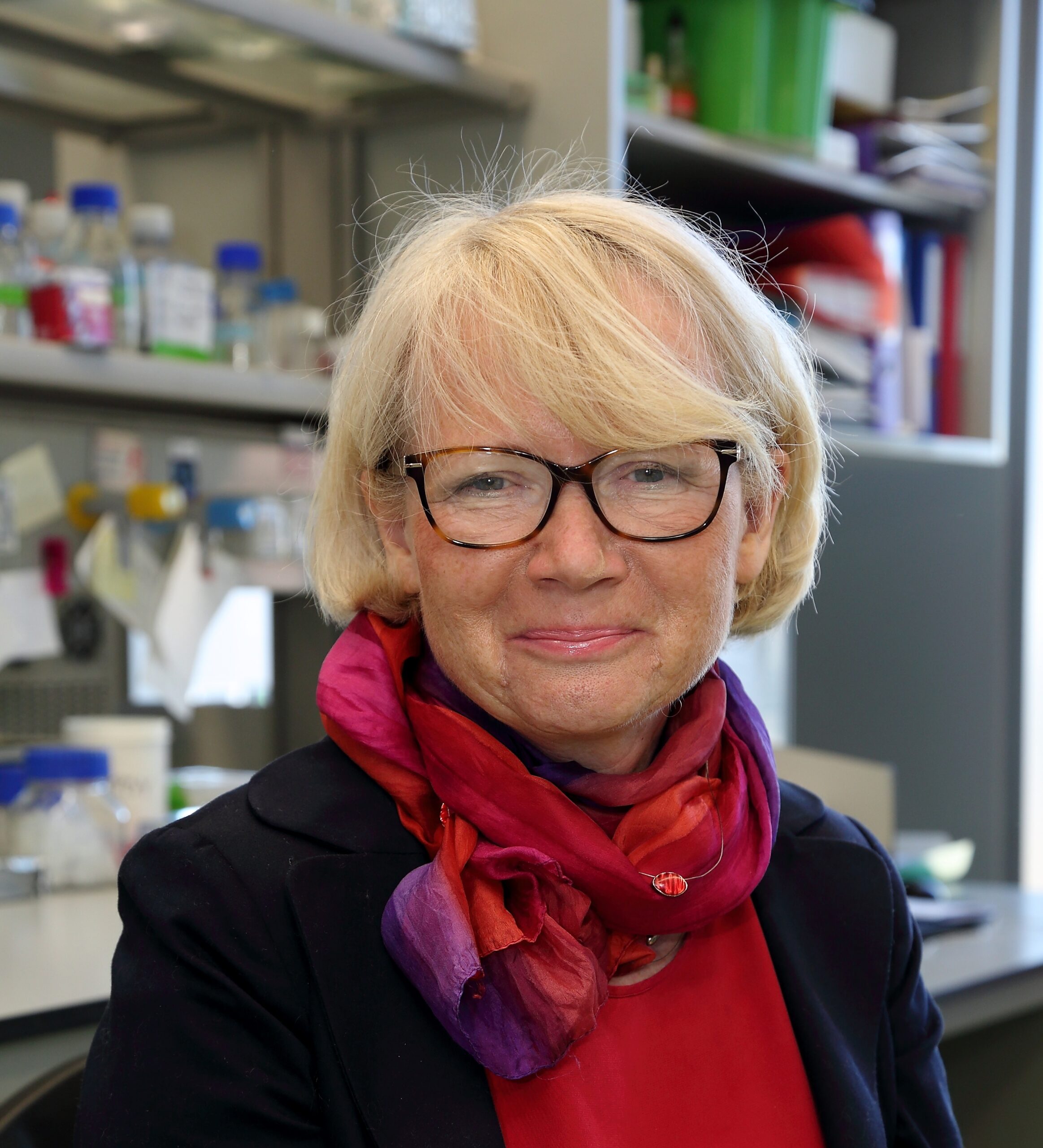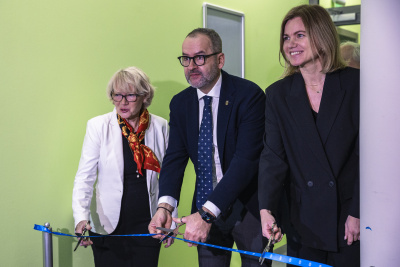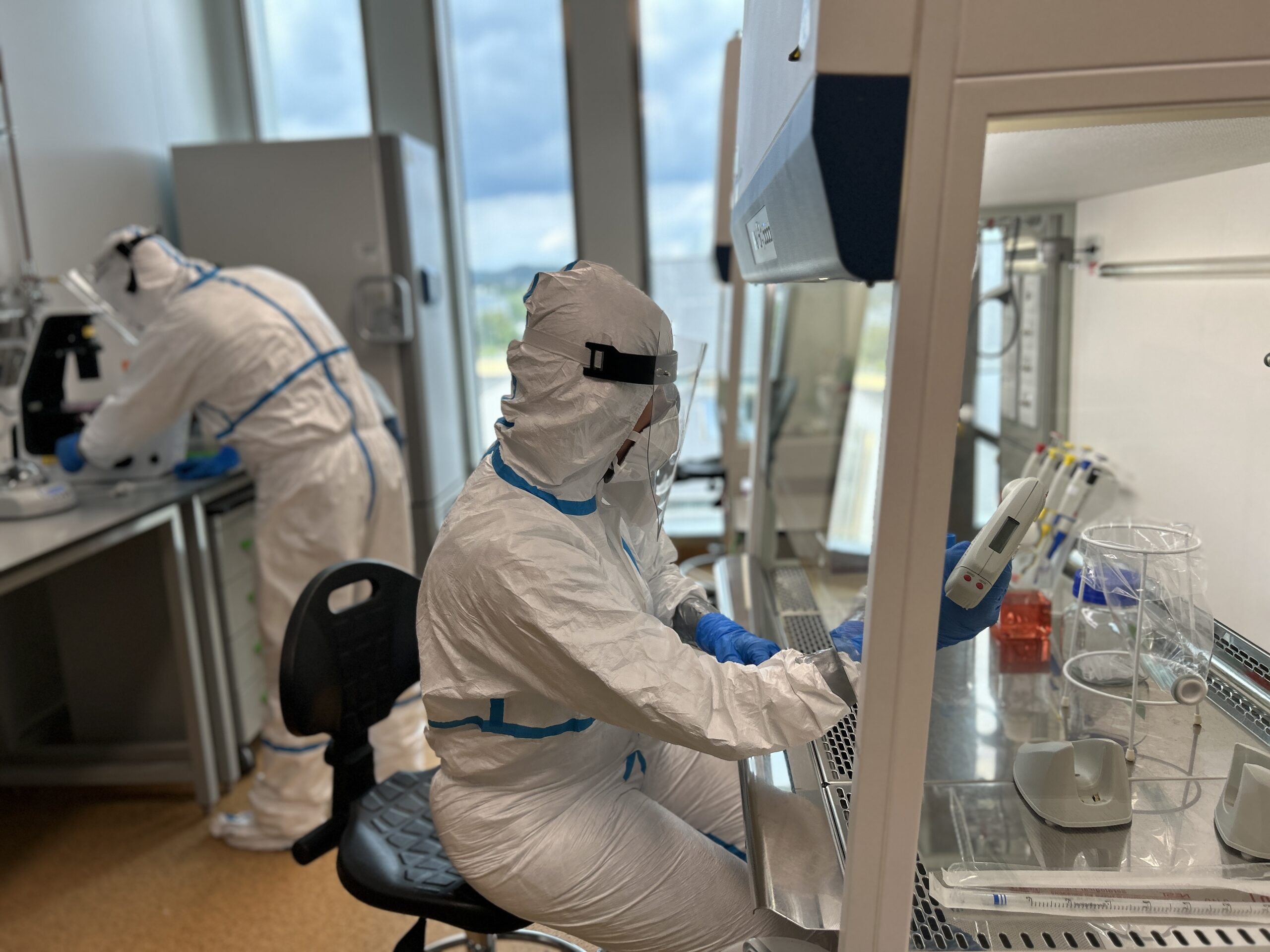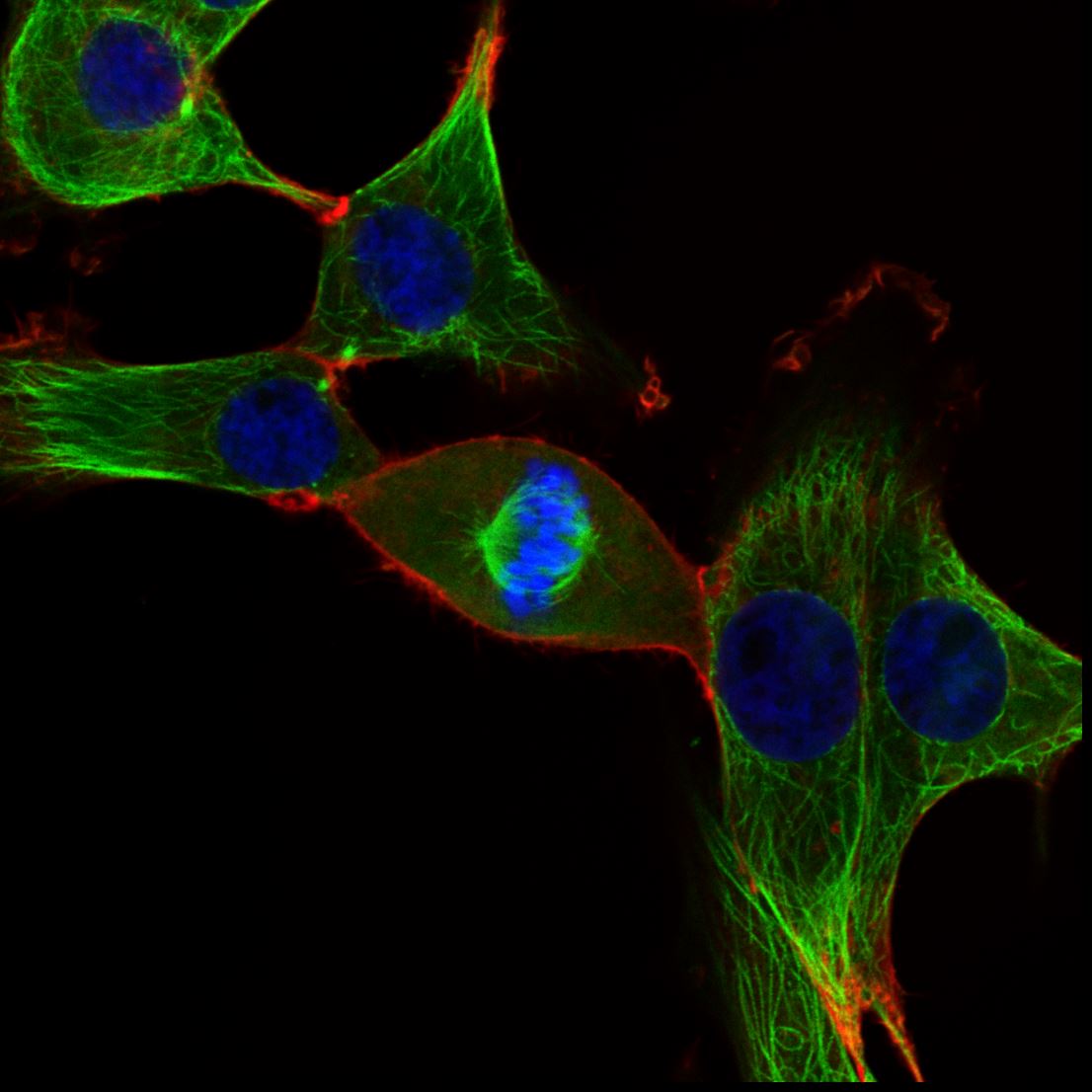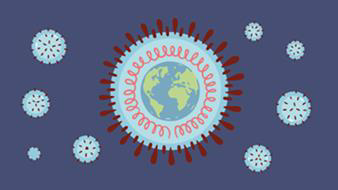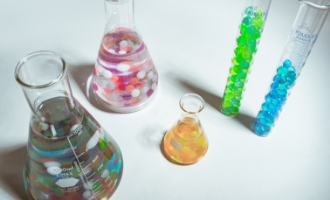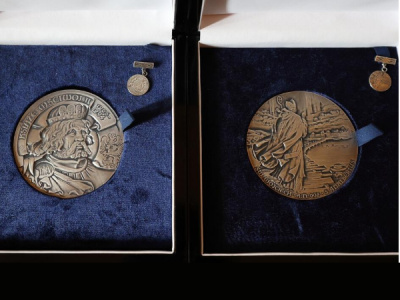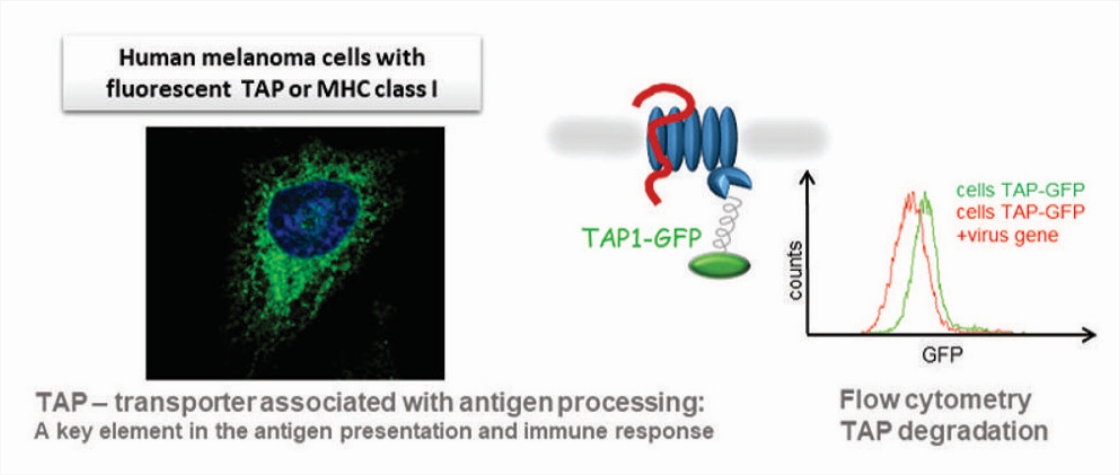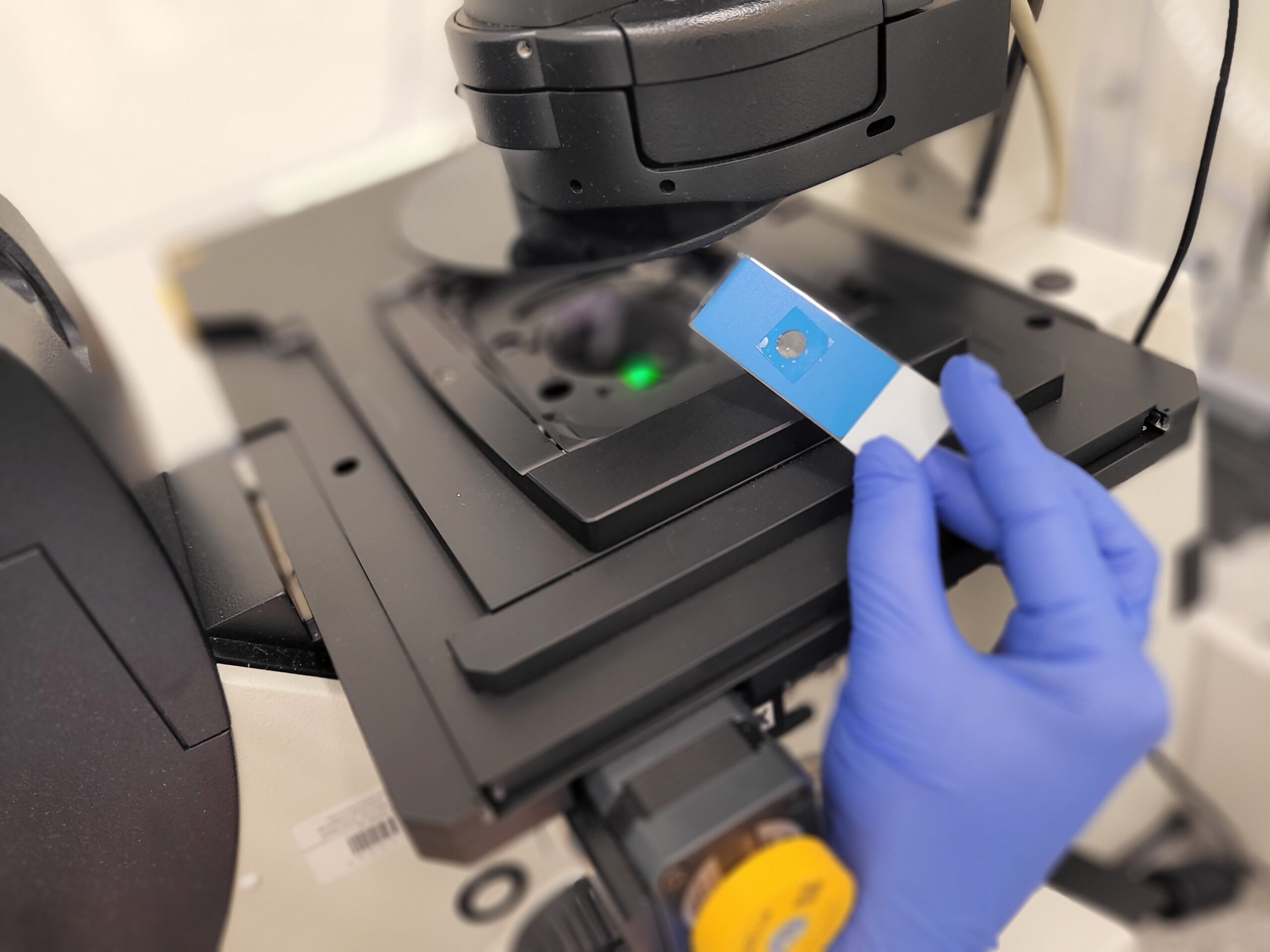News
22/01/2024
Professor Krystyna Bieńkowska-Szewczyk talks about Poland’s most modern BSL3+ laboratory established at the Intercollegiate Faculty of Biotechnology UG and MUG and discusses working with viruses in an interview with Julia Bereszczyńska.
22/01/2024
The first BSL-3+ laboratory in northern Poland is about to begin work. On January 22, the Intercollegiate Faculty of Biotechnology UG and MUG held the official opening of a unique space where research into, among other things, coronavirus and tick-borne encephalitis virus will be conducted. The Minister of Science and Higher Education, Dariusz Wieczorek, congratulated UG on the new unit.
1/01/2022
prof. Bogusław Szewczyk
The aim of the project is to develop vaccine candidates based on mRNA/VLP technology against one of three zoonotic viral pathogens (SARS-CoV-2 coronavirus, Tick-Borne Encephalitis Virus, TBEV and West Nile virus, WNV) that are of great importance to human health around the world.
The development path started from designing the mRNA encoding for virus antigens, through the potential vaccine candidate evaluation, preclinical and I phase of the clinical studies. The whole project is divided into 10 tasks. They include a research stage using mRNA/VLP technology and a development stage of the production and analysis process on a laboratory and pilot scale.
The suspected project effect combines the advantages of both mRNA and VLPs: high effectiveness, long-lasting, the beginning of the dosing regimen, the possibility of storage in convenient conditions and safety in addition to control and pediatric use.
Project co-financed by the state from the Medical Research Agency, in the competition: Development of new technologies using RNA technology
The consortium consists of:
– Adamed Sp. Zoo. (Project leader)
– University of Gdansk
– Institute of Biotechnology and Biophysics of the Polish Academy of Sciences
Project value PLN 87,517,519.25, including PLN 11,382,750.00 for UG
Funding PLN 58,494,498.19
11/10/2023
The BioSafety Level 3+ (BSL3+) laboratory, one of the most modern in Poland, which enables a full range of work with airborne viral pathogens, has just been opened. Please check the movie, that describes (in Polish) how it works.
30/06/2023
We are pleased to announce that our collegue Anna Czarnota has defended her doctoral dissertation entitled „Chimeric HBV – HCV virus-like particles as a potential vaccine against Hepatitis C” and earned PhD degree on 30.06.2023. Anna Czarnota conducted her work in the Laboratory of Virus Molecular Biology under the supervision of prof. Krystyna Bieńkowska-Szewczyk and dr Katarzyna Grzyb. Congratulations!
30/06/2023
We are pleased to announce that our collegue Natalia Derewońko has defended her doctoral dissertation entitled „Role of viral proteins and their interaction with host factors during cell-to-cell spread of alphaherpesviruses” and earned PhD degree on 30.06.2023. Natalia Derewonko conducted her work in the Laboratory of Virus Molecular Biology under the supervision of prof. Krystyna Bieńkowska-Szewczyk and dr Michał Rychłowski. Congratulations!
20/06/2023
Biochimica et Biophysica Acta-Biomembranes 2023, 1865(8): 184200 (doi: 10.1016/j.bbamem.2023.184200)
12/05/2023
8th European Congress of Virology (ECV) is Europe’s largest virology congress, attended by European scientists working in various fields of virology. The Congress takes place every 3 years.
The European Society of Virology entrusted prof. Krystyna Bieńkowska-Szewczyk organization of the reunion in 2022, but due to the ongoing pandemic, the date was postponed to 2023. The congress was co-hosted by prof. Thomas Mettenleiter, President of the Friedrich Loeffler Network of Research Institutes (FLI) in Germany and WHO expert.
The Congress was held at the Baltic Philharmonic on May 4-7, 2023. Almost 650 participants took part in the conference and shared their scientific experience and knowledge during interesting talks and poster sessions.
30/03/2023
We are pleased to announce that our collegue Gabriela Brzuska has defended her doctoral dissertation entitled „Recombinant virus-like particles as potential vaccine candidates against Zika virus” and earned PhD degree on 2.12.2022. Gabriela Brzuska conducted her work in the Laboratory of Recombinant Vaccines under the supervision of dr hab. Ewelina Król, prof. UG. Congratulations!
22/02/2023
We are happy to announce that our collegue Dr Łukasz Rąbalski, assistant professor at the Department of Recombinant Vaccines, received an individual prestigious award from the Minister of Education and Science for a significant achievement in the field of scientific activity.
29/12/2022
Laboratory of Virus Molecular Biology welcomes the new Team Member and wishes dr. Amandine Hauer good luck with her research!
6/03/2022
prof. dr hab. Krystyna Bieńkowska-Szewczyk
3/08/2023
Eurosurveillance 2023, 28(31): 2300390 (doi: 10.2807/1560-7917.ES.2023.28.31.2300390)
02/12/2022
We are pleased to announce that our collegue Magda Wąchalska has defended her doctoral dissertation entitled „Participation of cellular proteins in the inhibition of antigen presentation dependent on UL49.5 protein of bovine herpesvirus BHV-1” and earned PhD degree on 2.12.2022. Magda Wąchalska conducted her work in the Laboratory of Virus Molecular Biology under the supervision of prof. Krystyna Bieńkowska-Szewczyk and dr Andrea Lipińska. Congratulations!
26/11/2021
mgr Gabriela Brzuska
03/03/2022
dr Łukasz Rąbalski
20/06/2023
Journal of Extracellular Vesicles 2023, 12: 12335 (doi: 10.1002/jev2.12335)
17/08/2022
Laboratory of Virus Molecular Biology at the Intercollegiate Faculty of Biotechnology, University of Gdansk and Medical University of Gdansk is seeking a post-doc (adjunct-research position) candidate within the NCN OPUS 20 Project “Immunomodulatory properties of SARS-CoV-2 coronavirus proteins” led by dr Andrea Lipińska.
26/11/2021
dr Katarzyna Grzyb
20.04.2022
dr hab. Ewleina Król, prof. UG
8/06/2023
Frontiers in Molecular Biosciences 2023, 10: 1128320 (doi: 10.3389/fmolb.2023.1128320)
02/06/2022
Gdańsk City Council has awarded prof. Krystyna Bieńkowska-Szewczyk with the highest honor – Saint Adalebrtus Medal (Św. Wojciech Medal) – for the impact on the development of science in the national and international dimension, as well as the development of the health service, higher education and the economy, for the impact on cooperation and integration of the academic community and involvement in the fight against the COVID-19 pandemic. Congratulations!
26/11/2021
dr hab. Ewelina Król, prof. UG
06/03/2022
dr Andrea Lipińska
8/05/2023
International Journal of Molecular Sciences 2023, 24(9): 8454 (doi: 10.3390/ijms24098454)
27/05/2022
We are pleased to announce that our collegue Kinga Grabowska has defended her doctoral dissertation entitled „Interactions of selected alphaherpesviral glycoprotein B homologs with the endosomal-exosomal pathway proteins and MHC class II molecules” and earned PhD degree on 27.05.2022. Kinga Grabowska conducted her work in the Laboratory of Virus Molecular Biology under the supervision of prof. Krystyna Bieńkowska-Szewczyk and dr Andrea Lipińska. Congratulations!
03/03/2022
dr Katarzyna Grzyb
16/02/2023
International Journal of Molecular Sciences 2023, 24(4): 3952 (doi: 10.3390/ijms24043952)
20/05/2021
dr Andrea Lipińska
06/03/2022
dr Alicja Chmielewska
Antiviral properties of interferon induced transmembrane proteins (IFITMs) are investigated during infection and spread of hepatitis C virus (HCV), tick-borne encephalitis virus (TBEV) and coronaviruses. SARS-CoV-2 entry studies are based on pseudoparticles, a model system based on pseudotyped lentiviruseses, which we previously used during our work on HCV vector vaccine.
17/02/2023
Journal of Computational Chemistry 2023, 44(16): 1470-1483 (doi: 10.1002/jcc.27087)
15/05/2020
dr hab. Ewelina Król, prof. UG
04/03/2022
dr Michał Rychłowski
Our newest arrival is laser microdissection unit, which is an innovative tool designed for very precise isolation of individual cells or their organelles. This method is used for analysis of the mechanisms of virus spread using special cellular connections such as Tunnelling nanotubes (TNT).
18/05/2023
Microbiology Spectrum 2023, 11(3): e02564-22 (doi: 10.1128/spectrum.02564-22)
19/05/2020
mgr Magda Wąchalska
27/02/2023
Frontiers in Microbiology 2023, 14: 1111947 (doi: 10.3389/fmicb.2023.1111947)
16/12/2019
mgr Magda Wąchalska
25/05/2023
Microbiol Spectr. 2023 Jan 31;11(2):e0254622. doi: 10.1128/spectrum.02546-22
15/11/2017
dr Alicja Chmielewska
09/05/2023
Scientific Reports 2023, 13: 7534 (doi: 10.1038/s41598-023-34803-7)
15/11/2019
prof. dr hab. Bogusław Szewczyk
29/12/2022
Microbiology Spectrum 2022 (doi: 10.1128/spectrum.02885-22)
15/05/2017
mgr Anna Czarnota
13/01/2023
Journal of Molecular Biology 2023, 435(5): 167964 (doi: 10.1016/j.jmb.2023.167964)
27/12/2022
Antiviral Research 2023, 209: 105511 (doi: 10.1016/j.antiviral.2022.105511)
09/05/2016
dr Ewelina Król
12/07/2022
Nucleic Acid Research 2022 (doi: 10.1093/nar/gkac581)
19/10/2016
dr Łukasz Rąbalski
30/03/2022
Viruses 2022, 14(4), 730; https://doi.org/10.3390/v14040730
14/11/2016
dr Krzysztof Łepek
2022
Journal of Virology 2021 (doi: 10.1128/JVI.01130-21)
05/02/2015
dr Andrea Lipińska
12/15/2021
Current Issues in Molecular Biology 2022, 44(1): 273-287 (doi: 10.3390/cimb44010020)
27/03/2022
Journal of Nanobiotechnology 2022, 20(1): 160 (doi: 10.1186/s12951-022-01357-1)
16/11/2015
mgr Martyna Krejmer
03/03/2022
Clinical Microbiology and Infection doi: 10.1016/j.cmi.2021.12.001
09/10/2015
mgr Beata Gromadzka
28/03/2019
Journal of Veterinary Research 2019, 63 (1): 1-6 (doi: 10.2478/jvetres-2019-0020)
14/10/2015
prof. dr hab. Bogusław Szewczyk
22/01/2019
PLOS ONE 2019, 14 (1): e0210874 (doi: 10.1371/journal.pone.0210874)
08/12/2014
dr Łukasz Rąbalski
26/10/2019
Trends in Biotechnology 2019, S0167-7799(19): 30072-1 (doi: 10.1016/j.tibtech.2019.03.013)
30/09/2013
prof. dr hab. Bogusław Szewczyk
29/01/2019
Viruses 2019, 11(2): 115 (doi: 10.3390/v11020115)
08/01/2019
Journal of Immunology Research 2019, 2463731 (doi: 10.1155/2019/2463731)
20/02/2019
Molecules 2019, 24(6): 1129 (doi: 10.3390/molecules24061129)
29/06/2012
prof. dr hab. Krystyna Bieńkowska – Szewczyk
15/12/2019
European Journal of Pharmacology 2019, 865, UNSP 172747 (doi: 10.1016/j.ejphar.2019.172747)
30/05/2012
dr Ewelina Król
24/09/2019
Polish Journal of Veterinary Sciences 2019, 22 (3): 531-540 (doi: 10.24425/pjvs.2019.129961)
30/05/2012
mgr Łukasz Rąbalski
06/12/2019
Outlooks on Pest Management 2019, 30: 6 (doi: 10.1564/v30_dec_08)
02/09/2020
Frontiers in Plant Science 2020, 11:580330 (doi: 10.3389/fpls.2020.580330)
24/01/2012
dr Katarzyna Grzyb
16/07/2020
Journal of Breath Research 2020, 14: 041001 (doi: 10.1088/1752-7163/ab9c32)
21/11/2012
dr Katarzyna Grzyb
24/12/2020
Emerging Infectious Diseases doi: 10.3201/eid2709.210286
24/11/2011
prof. dr hab. Bogusław Szewczyk
13/12/2020
Pharmaceuticals (Basel) 2020, 13 (12): 460 (doi: 10.3390/ph13120460)
12/05/2011
mgr Ewelina Król
07/01/2021
Microbiology Resource Announcements 2021, 10 (1): e01274-20 (doi: 10.1128/MRA.01274-20)
12/05/2011
dr Andrea Lipińska
10/11/2021
Molecular Plant-Microbe Interactions 2021, (w druku) (doi: 10.1094/MPMI-06-21-0130-A)
30/07/2021
European Journal of Plant Pathology 2021, (w druku) doi: 10.1007/s10658-021-02334-4
03/12/2009
mgr Dawid Nidzworski
31/07/2021
Vaccines 2021, 9(8): 840 (doi: 10.3390/vaccines9080840)
03/12/2009
Glycosylation inhibitors as new antiviral agents against different strains of Influenza virus type A
mgr Ewelina Król
14/10/2021
Viruses-Basel 2021, 13(10): 2062 (doi: 10.3390/v13102062)
15/05/2018
dr Katarzyna Grzyb
30/09/2021
Eurosurveillance 2021, 26(39): 2100902 (doi: 10.2807/1560-7917.es.2021.26.39.2100902)
04/10/2006
prof. dr hab. Bogusław Szewczyk
06/10/2006
prof. dr hab. Krystyna Bieńkowska – Szewczyk,
Coordinator : R. Cortese, Italy
06/11/2021
Microbiological Research 2021, 248: 126746 (doi: 10.1016/j.micres.2021.126746)
06/10/2006
prof. dr hab. Krystyna Bieńkowska – Szewczyk
06/11/2021
Applied Surface Science, Elsevier BV – North-Holland 2021, 539: 148286 (doi: 10.1016/j.apsusc.2020.148286)
17/01/2006
prof. dr hab. Krystyna Bieńkowska – Szewczyk,
Coordinator: J. Ball. UK
06/11/2021
Vaccines 2021, 9(11): 1277 (doi: 10.3390/vaccines9111277)
07/01/2005
Collaborating institution: Federal Research Centre for Virus Disease of Animals,
Institute of Immunology, Dr Hanns – Joachim Rziha
06/11/2021
Vaccines 2021, 9(10): 1151 (doi: 10.3390/vaccines9101151)
19/12/2005
prof. dr hab. Krystyna Bieńkowska – Szewczyk
06/11/2021
Emerging Infectious Diseases 2021, 27(9): 2333-2339 (doi: 10.3201/eid2709.210286)
11/09/2003
prof. dr hab. Bogusław Szewczyk
06/11/2021
Viruses-Basel 2021, 13(10): 2062 (doi: 10.3390/v13102062)
05/02/2002
prof. dr hab. Krystyna Bieńkowska – Szewczyk
Collaboration with Ghent University, dr Hans Nauwynck
06/03/2018
Biochimica et Biophysica Acta (BBA) – Molecular Basis of Disease 2018, 1864: 115-125 (doi: 10.1016/j.bbadis.2017.10.014)
29/11/2002
prof. dr hab. Krystyna Bieńkowska – Szewczyk
06/03/2018
Virology 2018, 513: 136-145 (doi: 10.1016/j.virol.2017.09.029)
06/03/2018
Journal of Proteomics 2018, 177: 88-111 (doi: 10.1016/j.jprot.2018.02.022)
27/03/2002
prof. dr hab. Krystyna Bieńkowska – Szewczyk
27/03/2002
prof. dr hab. Krystyna Bieńkowska – Szewczyk
European Network for Hepatitis C Virus Envelope Glycoprotein Research (ENHCV)
06/03/2018
Cellular Physiology and Biochemistry 2018, 51(1): 393-410 (doi: 10.1159/000495236)
06/03/2018
Virology 2018, 519: 33-41 (doi: 10.1016/j.virol.2018.03.026).
06/03/2018
Journal of Biophotonics 2018, e201800079 (doi: 10.1002/jbio.201800079)
07/11/2018
Journal of Virology 2018; 9(10): e00090-18 (doi: 10.1128/JVI.00090-18)
06/03/2019
Translational Research 2019, 207: 44-55 (doi: 10.1016/j.trsl.2018.12.007)
06/03/2018
Molecules 2018 23(7): 1547 (doi: 10.3390/molecules23071547)
06/03/2018
Molecules 2018, 23(6): 1435 (doi: 10.3390/molecules23061435)
06/03/2019
Viruses 2019, 11 (9): 784 (doi: 10.3390/v11090784)
06/03/2018
International Journal of Molecular Sciences 2018, 19(1): 83 (doi: 10.3390/ijms19010083)
06/03/2022
European Journal of Plant Pathology 2018, 150(2): 413-425 (doi: 10.1007/s10658-017-1289-3)
03/05/2022
Molecules 2018, 23(8): 2017 (doi: 10.3390/molecules23082017)
06/03/2018
Journal of Invertebrate Pathology 2018, 157: 90-99 (doi: 10.1016/j.jip.2018.08.006)
06/03/2019
Fish Physiology And Biochemistry 2019, 45(5): 1615-1625 (doi: 10.1007/s10695-019-00650-5)
06/03/2019
Biochimica et Biophysica Acta-Biomembranes 2019, 1861 (5): 926-938 (doi: 10.1016/j.bbamem.2019.02.005)
06/03/2019
Journal of General Virology 2019, 100 (3): 497-510 (doi: 10.1099/jgv.0.001224)
06/03/2019
International Journal of Molecular Sciences 2019, 20(2); 261 (doi: 10.3390/ijms20020261)
06/03/2019
Scientific Reports 2019, 9: 4987 (doi: 10.1038/s41598-019-41092-6)
06/03/2019
Nanomaterials 2019, 9: 973 (doi: 10.3390/nano9070973)
22/10/2019
Structural Chemistry 2019, 30(6): 2327-2338 (doi: 10.1007/s11224-019-01428-4)
06/03/2019
FEBS Journal 2019, 286(22): 4579-4596 (doi: 10.1111/febs.14977)
07/11/2019
Journal of Proteomics 2019, 209: 103505 (doi: 10.1016/j.jprot.2019.103505)
06/03/2019
Cells 2019 8(10): 1112 (doi: 10.3390/cells8101112)
09/03/2019
Cells 2019, 8(12): 1590 (doi: 10.3390/cells8121590)
07/11/2020
Sensors 2020, 20(3): 813 (doi: 10.3390/s20030813)
07/11/2020
Biochimica et Biophysica Acta- Molecular Basis of Disease 2020, 1866(3): 165610 (doi: 10.1016/j.bbadis.2019.165610)
07/11/2020
Viruses 2020, 12: 429 (doi:10.3390/v12040429)
07/11/2020
Biochimica et Biophysica Acta (BBA) – Molecular Cell Research 2020, 1867(8): 118723 (doi: 10.1016/j.bbamcr.2020.118723)
07/11/2020
Journal of Molecular Liquids 2020 (doi: 10.1016/j.molliq.2020.113804)
07/11/2020
Vaccines 2020, 8(2): 294 (doi: 10.3390/vaccines8020294)
07/11/2020
Journal of Biochemistry 2020, 168(6): 575-588 (doi: 10.1093/jb/mvaa059)
07/11/2020
Eurosurveillance 2020, 25 (32): 7-14 (doi: 10.2807/1560-7917.ES.2020.25.32.2001410)
07/11/2020
Membranes 2020, 10 (12): 373 (doi: 10.3390/membranes10120373)
07/11/2021
Chemistry & Biodiversity 2021, 18: e2000883 (doi: 10.1002/cbdv.202000883)
06/11/2021
Journal of Cellular Physiology 2021, 236(6): 4655-4668 (doi: 10.1002/jcp.30188)
06/11/2021
Antioxidants 2021, 10(5): 786 (doi: 10.3390/antiox10050786)
05/11/2021
Journal of Experimental Botany 2021, 72(2): 320-340 (doi: 10.1093/jxb/eraa430)
07/11/2021
Pharmaceutics 2021, 13(7): 946 (doi: 10.3390/pharmaceutics13070946)
03/09/2021
npj Vaccines 2021, 6(1): 142 (doi: 10.1038/s41541-021-00404-6)
06/11/2021
Biomolecules 2021, 11(5): 693 (doi: 10.3390/biom11050693)
06/11/2021
Pathogens 2021, 10(9): 1212 (doi: 10.3390/pathogens10091212)
03/11/2021
International Journal of Molecular Sciences 2021, 22: 9256 (doi: 10.3390/ijms22179256)
04/03/2021
Microbial Cell Factories 2021, 20(1): 186 (doi: 10.1186/s12934-021-01677-1)
06/11/2021
Eurosurveillance 2021, 26(39): 2100902 (doi: 10.2807/1560-7917.es.2021.26.39.2100902)
04/11/2021
International Journal of Molecular Sciences 2021, 22(22): 12574 (doi: 10.3390/ijms222212574)



